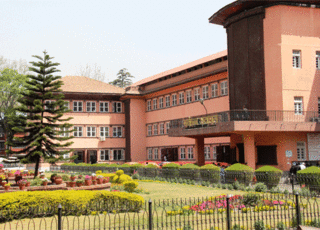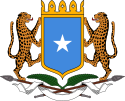
The politics of Somalia takes place in a framework of federal parliamentary republic. According to the Constitution of Somalia, the President of Somalia is head of state, and Prime Minister as head of government who is appointed by the President with the parliament's approval. The country has a bicameral legislature, which consists of the Senate and the National Assembly of Somalia. Together, they make up the Federal Parliament of Somalia. In 2012, the Federal Parliament of Somalia was concurrently inaugurated, ushering in the Federal Government of Somalia, the first permanent central government in the country since the start of the civil war. With a new constitution and a new parliament representing diverse parties and factions, Somalia's political structure subsequently showed signs of stabilization.
Separation of powers refers to the division of a state's government into "branches", each with separate, independent powers and responsibilities, so that the powers of one branch are not in conflict with those of the other branches. The typical division into three branches of government, sometimes called the trias politica model, includes a legislature, an executive, and a judiciary. It can be contrasted with the fusion of powers in parliamentary and semi-presidential systems where there can be overlap in membership and functions between different branches, especially the executive and legislative. In most non-authoritarian jurisdictions, however, the judiciary almost never overlaps with the other branches, whether powers in the jurisdiction are separated or fused.

Article Three of the United States Constitution establishes the judicial branch of the U.S. federal government. Under Article Three, the judicial branch consists of the Supreme Court of the United States, as well as lower courts created by Congress. Article Three empowers the courts to handle cases or controversies arising under federal law, as well as other enumerated areas. Article Three also defines treason.
Judicial independence is the concept that the judiciary should be independent from the other branches of government. That is, courts should not be subject to improper influence from the other branches of government or from private or partisan interests. Judicial independence is important for the idea of separation of powers.

The Supreme Court of India is the supreme judicial authority and the highest court of the Republic of India. It is the final court of appeal for all civil and criminal cases in India. It also has the power of judicial review. The Supreme Court, which consists of the Chief Justice of India and a maximum of fellow 33 judges, has extensive powers in the form of original, appellate and advisory jurisdictions.
Chapter 9: Judiciary.Chapter 9 of the 1997 Constitution of Fiji is titled Judiciary. It is divided into twenty-two sections, setting out the composition and functions of the Judicial branch of the Fijian government.

The Supreme Court of Nepal is the highest court in Nepal. It has appellate jurisdiction over decisions of the seven High Courts and extraordinary original jurisdiction. The court consists of twenty Justices and one Chief Justice.

The judiciary of South Africa is the body of judges and magistrates who sit in the courts of South Africa. The judiciary is an independent branch of the government, subject only to the Constitution of South Africa and the laws of the country. The Judiciary interprets the law of South Africa, using as the basis of its interpretation the laws enacted by the South African Parliament as well as explanatory statements made in the legislature during the enactment.

In most legal jurisdictions, a supreme court, also known as a court of last resort, apex court, and highcourt of appeal, is the highest court within the hierarchy of courts. Broadly speaking, the decisions of a supreme court are not subject to further review by any other court. Supreme courts typically function primarily as appellate courts, hearing appeals from decisions of lower trial courts, or from intermediate-level appellate courts.

The judiciary of Pakistan is a hierarchical system with two classes of courts: the superior judiciary and the subordinate judiciary. The superior judiciary is composed of the Supreme Court of Pakistan, the Federal Shariat Court and five High Courts, with the Supreme Court at the apex. There is a High Court for each of the four provinces as well as a High Court for the Islamabad Capital Territory. The Constitution of Pakistan entrusts the superior judiciary with the obligation to preserve, protect and defend the constitution. Neither the Supreme Court nor a High Court may exercise jurisdiction in relation to Tribal Areas, except otherwise provided for. The disputed regions of Azad Kashmir and Gilgit–Baltistan have separate court systems.

The judiciary of India is a system of courts that interpret and apply the law in the Republic of India. India uses a common law system, first introduced by the British East India Company and with influence from other colonial powers and Indian princely states, as well as practices from ancient and medieval times. The constitution provides for a single unified judiciary in India.

The judicial system of Bhutan is the purview of the Royal Court of Justice, the judicial branch of the government of Bhutan under the Constitution of 2008. The judicial system comprises the Judicial Commission, the courts, the police, the penal code, and regulations on jabmi (attorneys).
The Federal Government of Somalia (FGS) is the internationally recognised government of Somalia, and the first attempt to create a central government in Somalia since the collapse of the Somali Democratic Republic. It replaced the Transitional Federal Government (TFG) of Somalia on 20 August 2012 with the adoption of the Constitution of Somalia.

The Judiciary of Kenya is the system of courts that interprets and applies the law in Kenya. After the promulgation of the Constitution of Kenya in 2010, the general public, through parliament, sought to reform the judiciary. Parliament passed the Magistrates and Judges Vetting Act of 2011. A major part of reforming the judiciary was the vetting of Magistrates and Judges in an attempt to weed out unsuitable ones. The Judicature Act has also been amended to raise the minimum number of Magistrates and Judges allowing more judicial officers to be hired. More magistrates and judges are needed to clear the backlog of cases that have caused great delay in the conclusion of cases and to staff new courts. New courts are needed to bring the courts closer to the people which is in line with devolution, a major principle written into the Constitution of 2010. New courts like the High Court opened in Garissa in November 2014 is a good example. In the past residents of North Eastern Kenya had to go all the way to Embu to access a High Court.
Farah Sh. Abdulkadir Mohamed is a Somali politician. From January to February 2015, he served as the Minister of Justice and Constitutional Affairs of Somalia. He was also briefly the Minister of Presidential Affairs.

The National Judicial Appointments Commission (NJAC) was a proposed body which would have been responsible for the recruitment, appointment and transfer of judicial officers, legal officers and legal employees under the government of India and in all state governments of India. The commission was established by amending the Constitution of India through the 99th constitution amendment with the Constitution (Ninety-Ninth Amendment) Act, 2014 or 99th Constitutional Amendment Act-2014 passed by the Lok Sabha on 13 August 2014 and by the Rajya Sabha on 14 August 2014. The NJAC would have replaced the collegium system for the appointment of judges as invoked by the Supreme court via judicial fiat by a new system. Along with the Constitution Amendment Act, the National Judicial Appointments Commission Act, 2014, was also passed by the Parliament of India to regulate the functions of the National Judicial Appointments Commission. The NJAC Bill and the Constitutional Amendment Bill, was ratified by 16 of the state legislatures in India, and subsequently assented by the President of India Pranab Mukherjee on 31 December 2014. The NJAC Act and the Constitutional Amendment Act came into force from 13 April 2015.
The Judicial Service Commission is an adjunct of the Ministry of Justice of the Federal Government of Somalia.

The judiciary of South Korea is the judicial branch of South Korean central government, established by Chapter 5 and 6 of the Constitution of South Korea.

The Ninety-ninth Amendment of the Constitution of India, officially known as The Constitution Act, 2014, formed a National Judicial Appointments Commission. 16 State assemblies out of 29 States including Goa, Rajasthan, Tripura, Gujarat and Telangana ratified the Central Legislation, enabling the President of India to give assent to the bill. The amendment was struck down by the Supreme Court on 16 October 2015.












